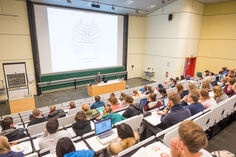- Studies
- Overview DFG-Projects
- Legal matters
- Data Protection
- Quality Management
- CTIS Management
- IT and Information Security
- Fees
- Meeting dates
- About us
- Contact
Notification of a research project with a statement from another German ethics committee
Explanation of the notification procedure
If a research project has already been reviewed by another Ethics Committee established in accordance with state law, physicians are only required to notify their participation to the Ethics Committee responsible for them, as stipulated in Section 15 (2) of the Professional Code of Physicians of the Baden-Württemberg Medical Association. In such cases, a single vote is sufficient for the research project (→ one study – one vote).
This notification does not entail a new review by the local Ethics Committee to which it is submitted. Consequently, no formal statement is issued by the local Ethics Committee, as was previously customary. Instead, the Committee confirms receipt of the notification by letter. Once this confirmation has been received, the research project may proceed at the local site.
Any amendments to a notified research project must be submitted to the responsible Ethics Committee (within Germany) for review. Amendments that specifically affect the local study centre(s) must also be submitted to the corresponding local Ethics Committees (→ e.g., addition of study centre(s), end of study, deregistration of centres, or change of local principal investigator). Furthermore, amendments must be submitted if they impact any documents originally included with the notification (see below).
Additional information regarding the notification process and the "one study – one vote" procedure is available on the website of the Association of Medical Ethics Committees in Germany, which also provides a detailed guideline with further explanations.
Glossary on the notification procedure
- Responsible Ethics Committee (within Germany): The Ethics Committee that conducts the review of the research project and issues a formal statement ("vote"). As a rule, this is the committee responsible for the principal investigator (PI) who oversees the organisation of the study in Germany.
- Local Ethics Committee: An Ethics Committee responsible for a local study centre, to which the research project is submitted for notification only, without a full review.
- Principle Investigator (PI) for Germany: The individual responsible for the overall conduct and coordination of a multicentre research project within Germany.
- Local Principle Investigator (PI): The individual responsible for the conduct and coordination of the study at a specific local study centre, who is not the PI for Germany.
Examples
Example 1: Principal Investigator (PI) for Germany at UKHD
A physician at UKHD is planning a multicentre, prospective research project involving collaborators from the University Hospital Tübingen and the University Hospital Hamburg-Eppendorf. The physician from Heidelberg will be responsible for the overall implementation and coordination of the study in Germany, serving as the PI for Germany. In Tübingen and Hamburg, local physicians have agreed to take responsibility for conducting and coordinating the study at their respective sites, acting as local PIs.
The physician in Heidelberg prepares the application for ethical review. As this is a multicentre study, she compiles a list of participating study centres and obtains the declarations of suitability from her cooperation partners for their respective sites. She submits the complete application to the Ethics Committee in Heidelberg, which is responsible for her and thus becomes the responsible Ethics Committee (within Germany). The Heidelberg Ethics Committee reviews the research project and issues a formal statement listing the study centres for which declarations of suitability have been provided. The physician in Heidelberg then forwards this statement, along with the study documents, to her cooperation partners.
The physicians in Hamburg and Tübingen subsequently notify their respective Ethics Committees (→ local Ethics Committees) of their participation in the research project. For this purpose, they submit the "Notification to the local Ethics Committee" form, the declaration of suitability for their own study centre, the structured synopsis (→ as it is a prospective study), the list of study centres, and the statement issued by the Heidelberg Ethics Committee. The local Ethics Committees confirm receipt of the notification—completing the process.
Example 2: Local PI at UKHD
A physician at UKHD is invited by a colleague from the University Hospital Cologne to participate in a multicentre research project for which she serves as the PI for Germany. The project involves a retrospective data analysis of a large pooled dataset. The physician from Heidelberg expresses interest and agrees to participate.
He first completes the declaration of suitability for his study centre at UKHD, signs it himself, and obtains the signature of his clinic director. He sends the completed form to his colleague in Cologne, who reports the additional study centre to the Ethics Committee at the University of Cologne as an amendment. To do so, she submits the amendment form, the updated list of study centres, and the declaration of suitability to the Ethics Committee in Cologne. The Committee acknowledges the notification of the additional study centre in writing. The physician in Cologne forwards this acknowledgement to the physician in Heidelberg.
The physician in Heidelberg can now notify the Heidelberg Ethics Committee of his participation in the research project. He submits the "Notification to the local Ethics Committee" form, the declaration of suitability for his own study centre, the study protocol according to checklist variant D (short protocol) (→ as it is a retrospective study), the list of study centres, and the acknowledgement from the Cologne Ethics Committee. The Heidelberg Ethics Committee confirms receipt of the notification—concluding the process.
Documents to be submitted (each as a separate PDF):
- Notification to a local ethics committee
- For a study with a study protocol according to checklist variant A (prospective studies): Structured synopsis in German, with version and date
- For a study with a study protocol according to checklist variant B, C or D (sample utilisation from biobank, data utilisation from registry or retrospective study): Study protocol (→ short protocol) according to the respective checklist (B, C or D)
- List of participating study centres including the local PIs with version and date in the header or footer of the document
- Declaration of suitability of the study centre and approval of the clinic/institute management for the local study centre
- Formal statement or acknowledgement of the responsible Ethics Committee (within Germany)
- Billing address (→ a cover letter with the billing address is sufficient)
- Studies
- Overview DFG-Projects
- Legal matters
- Data Protection
- Quality Management
- CTIS Management
- IT and Information Security
- Fees
- Meeting dates
- About us
- Contact



![[Translate to English:] [Translate to English:]](/fileadmin/_processed_/9/b/csm_Firefly_Abstract_organic_flow_resembling_blood_vessels_shaped_as_a_tool__composed_of_glowing_651800_26778ea790.png)
